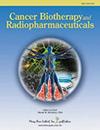Colorectal Cancer-Derived Exosomes Impair CD4+ T Cell Function and Accelerate Cancer Progression via Macrophage Activation.
IF 2.4
4区 医学
Q3 MEDICINE, RESEARCH & EXPERIMENTAL
引用次数: 0
Abstract
Background: Exosomal programmed death ligand 1 (PD-L1), an exosomal membrane protein found in many tumor types, is reckoned to help regulate the immune microenvironment. However, the functions and the mechanisms underlying the exosome-mediated regulation of the immune microenvironment in colorectal cancer (CRC) remain unknown. Methods: Western blotting was used to investigate the levels of exosomal PD-L1 in the peripheral blood of patients with CRC and healthy controls. A CRC mouse model was constructed by administering 10 mg/kg azoxymethane (AOM) and dextrane sodium sulfate (DSS) intraperitoneally. The mice were then administered the control or CRC-derived exosomes to examine the regulatory effect of the exosomes on macrophage infiltration and CRC development. In vitro studies, using a coculture system, and flow cytometry analysis were conducted to examine the relationship between the regulatory effect of CRC-derived exosomes on CD4+ T cells and tumor-associated macrophages. RNA-seq and reverse transcription-quantitative polymerase chain reaction assays were used to investigate the mechanisms underlying the regulatory effect of the CRC-derived exosomes on macrophage proliferation and the regulation of the immune microenvironment during CRC development. Results: In patients with CRC, higher levels of exosomal PD-L1 were associated with a more severe form of disease. The treatment of mice with AOM/DSS-induced CRC with CRC-derived exosomes resulted in high levels of macrophage proliferation, increased PD-L1 levels in macrophages, and accelerated CRC progression. Importantly, analysis of an in vitro coculture system and flow cytometry analysis showed that the CRC-derived exosomes transported PD-L1 into macrophages and impaired CD4+ T cell function. Preliminary data suggest that the NF-κb signaling pathway regulates the function of CRC-derived exosomal PD-L1-dependent macrophages. Conclusion: CRC-derived exosomes induce the proliferation of macrophages and increase their PD-L1 levels. They also impair CD4+ T cell function and promote CRC progression. Our findings reveal a novel exosomal PD-L1-mediated crosstalk between the CRC cells and immune cells in the CRC microenvironment.大肠癌衍生的外泌体通过巨噬细胞活化损害 CD4+ T 细胞功能并加速癌症进展
背景:外泌体程序性死亡配体1(PD-L1)是一种存在于多种肿瘤类型中的外泌体膜蛋白,被认为有助于调节免疫微环境。然而,外泌体介导的结直肠癌(CRC)免疫微环境调控的功能和机制仍然未知。研究方法采用 Western 印迹法检测 CRC 患者和健康对照组外周血中外泌体 PD-L1 的水平。通过腹腔注射 10 毫克/千克偶氮甲烷(AOM)和右旋糖酐硫酸钠(DSS)构建了 CRC 小鼠模型。然后给小鼠注射对照组或源自 CRC 的外泌体,以研究外泌体对巨噬细胞浸润和 CRC 发育的调节作用。利用共培养系统和流式细胞术分析进行了体外研究,以检验 CRC 衍生外泌体对 CD4+ T 细胞和肿瘤相关巨噬细胞的调节作用之间的关系。利用RNA-seq和反转录定量聚合酶链反应测定法研究了CRC衍生外泌体对巨噬细胞增殖的调控作用和CRC发展过程中免疫微环境的调控机制。结果发现在 CRC 患者中,外泌体 PD-L1 水平越高,病情越严重。用源自 CRC 的外泌体治疗 AOM/DSS 诱导的 CRC 小鼠会导致巨噬细胞高水平增殖、巨噬细胞中 PD-L1 水平升高以及 CRC 进展加速。重要的是,体外共培养系统分析和流式细胞术分析表明,CRC 衍生的外泌体将 PD-L1 运送到巨噬细胞中,并损害了 CD4+ T 细胞的功能。初步数据表明,NF-κb 信号通路调节了依赖于 PD-L1 的 CRC 源性外泌体巨噬细胞的功能。结论源自 CRC 的外泌体可诱导巨噬细胞增殖并增加其 PD-L1 水平。它们还会损害 CD4+ T 细胞的功能并促进 CRC 的进展。我们的研究结果揭示了一种新的外泌体 PD-L1 介导的 CRC 细胞与 CRC 微环境中免疫细胞之间的串扰。
本文章由计算机程序翻译,如有差异,请以英文原文为准。
求助全文
约1分钟内获得全文
求助全文
来源期刊
CiteScore
7.80
自引率
2.90%
发文量
87
审稿时长
3 months
期刊介绍:
Cancer Biotherapy and Radiopharmaceuticals is the established peer-reviewed journal, with over 25 years of cutting-edge content on innovative therapeutic investigations to ultimately improve cancer management. It is the only journal with the specific focus of cancer biotherapy and is inclusive of monoclonal antibodies, cytokine therapy, cancer gene therapy, cell-based therapies, and other forms of immunotherapies.
The Journal includes extensive reporting on advancements in radioimmunotherapy, and the use of radiopharmaceuticals and radiolabeled peptides for the development of new cancer treatments.

 求助内容:
求助内容: 应助结果提醒方式:
应助结果提醒方式:


